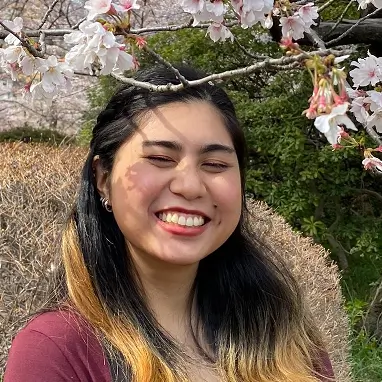Interview with Mary Grace of Lenovo about Her Experience of Working in Japan
Name: Mary Grygjeanne Grace Icay
Title: Linux Device Driver Component Owner
Organization: Lenovo
Date of birth: 26 years old
Hometown: Kalibo, Aklan, Philippines
Number of years in Japan: Since
LinkedIn URL: https://jp.linkedin.com/in/mary-grygjeanne-grace-icay-109184140


The 5th interview in the series of “interviews with foreign engineers in Japan“. EJable.com’s Ryoko Nagai talks to Mary Grygjeanne Grace of Lenovo, Japan, about her experiences of working in Japan, as well as Life in Japan.
Video Interview
Transcript of The Video
Ryoko: Hi, Grace; thank you for joining us here at edible today. We’re really happy to have you and this opportunity to get to know you a little better and hear your story here working in IT in Japan. And yeah, so today, we just want to start by asking you a little bit about your background and your introduction, please.
Grace: OK, so my full name is Mary Grygjeanne Grace Icay, but that’s kind of long, so please call me Grace. I graduated in 2017 from the University of the Philippines in the Visayas with BS in Computer Science. And right after that, I worked for Advanced World Solutions in the Philippines. Other people here in Japan probably know their sister company, Ubicom Holdings. Then in 2019, I got a job offer to work here in Japan as an outsourced employee for Lenovo Japan. Currently, I’m working as a Linux device driver component owner. Basically, I work both as a QA engineer and also a bridge engineer. So a lot of my work involves manual testing, but at the same time, I also get to communicate a lot with internal test teams, product vendors, OS vendors, and sometimes with the clients. So yeah, that’s it. Thank you.
Ryoko: Thank you for the introduction 😊. Can I know about your first encounter with Japan and if you were interested in working in Japan or why you decided to take the job to work here in Japan?
Grace: It’s kind of embarrassing, but probably a lot of us have first encountered Japan through shows. I mean, technically, anime, probably, and I kind of like the image it painted. And so I considered visiting Japan one day, so when I got the job offer, I thought it would be a nice change because I’d been working as a software developer for two years before I got the offer. And it was for a QA position which I had no idea about. But thankfully, the managers at Lenovo were willing to risk hiring me for the position. And thankfully, many of my coworkers are very nice and easy to communicate with, and they were able to help me kind of integrated into the work.
Ryoko: Oh wow. So have you been interested in Japan for a while, like way back before you got the job offer?
Grace: Yes, like yeah. As I mentioned, I have been a fan of anime, and at the same time, I was kind of interested in how their culture worked and daily life. Because I believe it was very different from how I lived back in the Philippines and also kind of there. Our company was an IT solutions company, but they also work as an outsourcing vendor for sending developers and QA testers to Japan. And many of these outsourced people, whenever they come back, always have stories about being in Japan. So, it piqued my interest more. And actually, when I entered the company, we also had some Japanese training. So we already had some interactions with Japanese, e.g., Native Japanese sensei, and when I talked with my broken Japanese at that time, it really impacted their decision to make the job offer and then my move to Japan.
Ryoko: Ohh, that’s nice. So, are you fluent in Japanese?
Grace: I wouldn’t say that 😊. It’s kind of just like the daily conversational level, maybe.
Ryoko: OK, so are there any struggles you face in terms of the language, like at work or just living here in Japan?
Grace: When I first got here, I had JLPT N4 level. When I went to the supermarket, the lady asked if I wanted a plastic bag. But then, I didn’t understand what she meant by “rejibukuro”. So, I was confused because it’s the “textbook” Japanese that they teach you for JLPT, and it’s very different from what the actual words Japanese people use. So, it was very confusing for me at first. However, as time passed, I got used to it. So basically, my problem right now is that my Japanese is still up to a daily conversational level. And most of my coworkers are older than me and use very technical words. So, there is a kind of gap I still need to bridge.
Ryoko: Oh, I see. So in terms of your working environment, is it mostly done in Japanese?
Grace: No, it’s mostly in English, but some meetings are in Japanese.
Ryoko: OK, I see. Can I know a little bit about your working environment? Are there many international colleagues? Or, yeah, the team, how is it?
Grace: So, currently, in our team in Linux, we have, I think, 5 Filipinos and then one Taiwanese person, who is my boss, and then three other South Asian people. But overall, there is a lot of, and I would say mostly, a mix of Filipinos and South Asians. I also encountered a few South-East Asians. There is a Malaysian guy I am friends with who is also a tester. Most of them do speak English. But a lot of older, I would say, native Japanese speakers would also at least try to converse with us in English. But since I’m also practicing my Japanese, I would tend to switch to Japanese to make them feel more comfortable in discussions.
Ryoko: Oh, OK, that’s so cool, I see. So, I guess you work with a lot of international colleagues. Was there something in particular that you had to change from working back in the Philippines to adapting to working in Japan?
Grace: I would say that most of my coworkers are still Filipinos, so there’s not much I had to change. But of course, I have to use English a lot more frequently here. And also, yeah, some Japanese. But in terms of work culture, it’s very diverse. And yes, there are a lot of foreign individuals who work here as well. So, it wasn’t that difficult to adjust.
Ryoko: Oh, OK, that’s very nice to hear. Then, can I Ask what you like about your job right now?
Grace: I really appreciate the work culture here at Lenovo because it’s a diverse group of people. At the same time, I’m still able to learn Japanese, like reading emails. Also, they have a lot of company events where everyone is involved, e.g., contractors and regulars, and sometimes some vendors or customers come to visit as well. Like with the last, I think that was the 30th Anniversary party, and I think that was the first big face-to-face event since the pandemic. So, it was really nice for a change after two years of being locked up.
Ryoko: I can imagine. Yeah, I see then outside of your like at work, do you have, like, how do I say, like, do you go for dinners or have a social aspect with your colleagues?
Grace: Within the team – I think we haven’t had team dinner yet, but I am very close with many Filipinos. I think it’s just a Filipino thing to bond over being Filipino in general, and many of the people here are very supportive. We used to have, like, welcome dinners and welcome parties. But we had to adjust to online meetings after the pandemic, so I’m not sure if that will come back, but hopefully soon.
Ryoko: Yeah, I hope so too. So, I see that you are trying to improve your Japanese. Do you have any, like, goals for your career here in Japan or any specific plans for the future here in Japan?
Grace: I actually just took the JLPT N2 this, hmmm… a week ago… two weeks ago, but I’m still not that confident. Especially for my reading abilities because there are just so many Kanji 😊.
Ryoko: Yeah, even for me, 😊.
Grace: Yeah, like so, I would like to, at least, my goal is to get to the N2 level by 2023.
Ryoko: Well, good luck with that, and I’m sure you can do it.
Grace: Thank you 😊
Ryoko: Then I want to move on to the living side a little bit more. So yeah, I see you’ve been interested in Japan through anime. Was there anything that, when you came here, you found shocking or that you really liked or disliked about Japanese traditions or culture?
Grace: I liked how convenient a lot of things are here. There is probably a vending machine or a convenience store just right around every corner. And then the transportation is really good. And I really love walking. I used to walk around parks back home, but everywhere is walkable. So yeah, I enjoy walking to and from the office. And there’s not much pollution, or there isn’t any pollution at all. Because back home, whenever I walked to the office, I would get sweaty, and whenever I washed my face, there was just so much dirt here that didn’t happen to me. And in terms of culture, I really appreciate the care that they put into customer service. I would say most especially like in the food industry. Also, you can get set meals at a very low price, but the quality still feels like it’s very expensive, so that’s something I really appreciate about Japan.
Ryoko: Do you often eat Japanese food then or cook Filipino food?
Grace: Well, recently, I’ve been eating out 😊 because I’ve been really busy since it’s kind of the end of the year, so there are a lot of projects that we’re supposed to finish before moving on to the next year. I actually enjoy Matsudaya. It’s like you can get a meal for like ¥500, but it still tastes good.
Ryoko: I agree. It’s convenient, then what do you like to do in your free time? Have you ever traveled around Japan, or with the pandemic, it’s been hard, but what do you do in your free time?
Grace: Usually, I really like traveling a lot. I think the farthest I’ve been to is probably Nagasaki.
Ryoko: OK.
Grace: Yeah, I went to, what was it, Huis Ten Bosch, I think.
Ryoko: Oh yeah, like the Dutch…
Grace: Yeah, yeah. At that time, I had been stuck in Japan for two years; I mean, I couldn’t go home because of the pandemic. So, I thought that a change of scenery would be good. And that was really nice because it was also snowing at that time. I think many of the areas are modeled after specific European cities. So, there was Amsterdam, and there was Holland. I can’t remember the other places, but it was nice.
Ryoko: Yeah, so you just mentioned snow, and I think in the Philippines, it’s quite warm. Has that been, like, difficult? How is the winter here for you?
Grace: Hmmm… 😊 So, during my first winter, I really wanted to see snow. It doesn’t snow much here around Yokohama or the Tokyo area—except for the last year, maybe…
Ryoko: I wasn’t here 😊, but yeah.
Grace: Yeah, it was either the end of last year or early this year. I think that it snowed for like 1-2 days. Uh, my first experience. I really enjoyed the snow because it was my first time seeing it, but after about two or three years, I wouldn’t say I liked it because, especially when it snowed here in Yokohama, I was supposed to go to the office the next day. And a lot of the snow still hadn’t melted, so it was difficult to walk to. I heard that, unlike Hokkaido, I think the pavements in Yokohama aren’t made for snow. It was difficult because Yokohama doesn’t usually get much snow, but I haven’t tried snowboarding yet, so maybe I would appreciate snow again.
Ryoko: True, snowboarding does sound very nice. Yeah, then maybe I want to ask a final question. Do you have any tips or advice for people who are currently looking for work in Japan or who want to work in Japan?
Grace: All right, so basically, some job ads do say that they don’t require Japanese, especially for developers, but I think it would be really helpful to get at least some basic knowledge or words, just because it could be helpful, like buying stuff and everything else. Brushing up on Japanese skills would be one of my main recommendations.
Ryoko: Thank you, thank you for that advice. Yeah, I don’t have any more questions unless you have anything else you want to share.
Grace: It’s probably difficult to suddenly change careers here, so I recommend people choose a career they like and wish to pursue.
Ryoko: Oh, thank you. That’s very nice. Yeah, that’s great. Yeah, well, thank you for joining us here at EJable. Well, we appreciate your time. And we hope for great success in your career, and thank you so much 😊.
Grace: Yeah, thank you, too 😊
